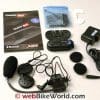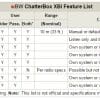This section describes owner impressions of the Chatterbox XBi system; using the intercom; a summary of the features; the “Bottom Line Ratings“; and the conclusion.
Controls
Each Chatterbox XBi Bluetooth intercom module has five separate controls: On/Off, Mode and Intercom, along with Volume Up and Volume Down, seem like one or two too many.
But, after using both models, my concerns remain unfounded. The smallish pressure buttons are easy to find and use.
Basic cell phone control is provided, although not all the features of the HTC Touch can be utilized from the XBi, a bit of a shortfall when compared to other multi-function headsets.
From a safety point of view however, the essentials work just fine.
Intercom Mode
The XBi intercom, when used as a basic rider with passenger system, has lower Class 2 power whereas the XBi2 has Class 1 capabilities for much longer range.
Even with its reduced range, for a rider with a passenger or when two riders are closed up at intersections or in urban traffic and when speeds and separation distances a bit less, the intercom is extremely reliable.
Whether system activated or manually by a quick push of the Intercom button, the duplex link remains ‘on’, so very little of any conversation session is lost unless ambient noise levels are very high. Without AGC (Automatic Gain Control) assisting, the volume levels need to be adjusted from time to time but rarely for rider-to-passenger use.
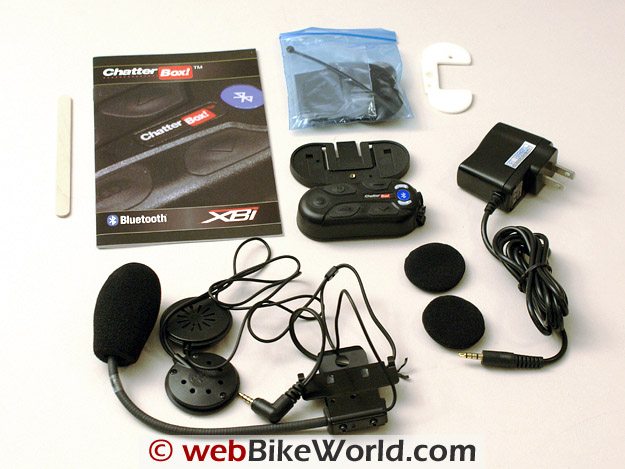
Battery Life
Like the XBi2 units, battery life falls within the timeframe identified in the guide. When the batteries are being recharged, the charging LED is Red and the module LED is Blue and when the charging is complete, the Red LED changes to Green and the module LED goes out.
Battery level status can be ascertained visually by using the Power button to activate a status sequence, or more directly by the alarm beeps that will sound in the headset once voltage drops below a certain level. The unit will switch itself off once the minimum voltage level is reached.
Audio Quality
Very good. The headset does not have the absolute fidelity of higher priced systems, but compared to the other brands on hand these are near the top: correct placement is everything. Music from higher powered peripheral devices that users typically carry today is faithfully reproduced.
Volume
Only on the highest audio setting can a trace of distortion be heard, usually during Intercom use and some of this can be traced to the active feedback loop in the system. Some distortion can be induced, but only when the external device is ‘cranked up’, something that the Chatterbox unit has little control over.
At highway speeds or in heavy urban traffic the intercom was perfectly useable without having to crank the volume to its maximum setting. The lowest and highest volume settings are announced by a short double tone in the headset.
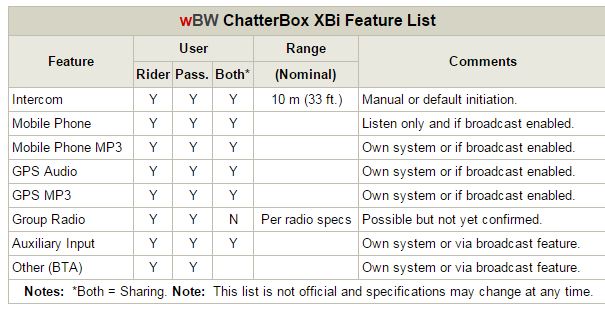
Something to Note
Given the “bleed-over” issue found with the XBi2 systems when using a Garmin zumo 550 and the intercom, I tried to recreate this situation with the XBi units. I did, successfully and repeatedly.
If the MP3 player on the zumo is being used as an audio stream by one user and if the intercom is activated by either party, the active audio stream from the zumo continues and is therefore heard (weakly) by both parties.
In essence, once the headset intercom is activated and based on headset priorities, this audio should be muted. However, it continues and both parties can hear it, although it is very weak.
When GPS navigation is active, this background MP3 stream will stop but resume when the navigation audio session ends. Obviously some channelization is happening and it would also seem that the device(s) in question are not managing audio correctly for some reason.
As stated in the XBi2 evaluation, the solution or workaround suggested by Chatterbox is to pass on the Bluetooth from the Garmin and use a compatible BTA (like the iCombi AG12) with the zumo and thus address both situations experienced.
Another workaround of course is to connect the Garmin and headset physically by using a stereo connection cable from the zumo to the 3.5mm auxiliary port on the XBi and share it…
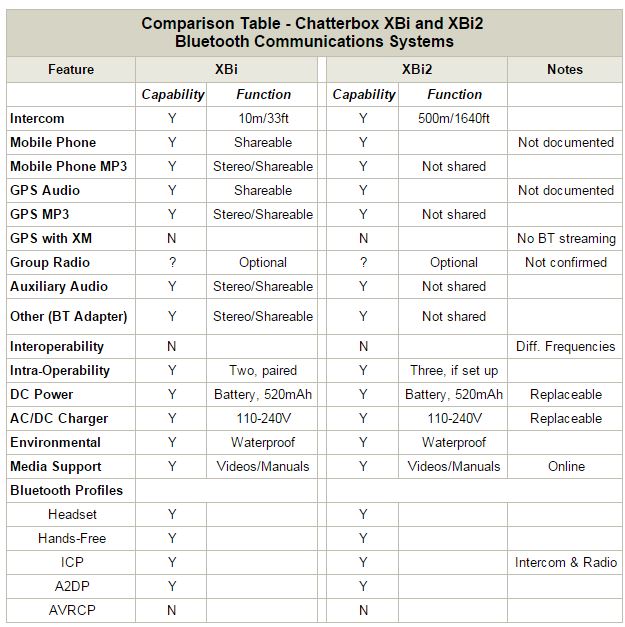
Chatterbox XBi Published Specifications
Product
- Bluetooth version 2.0, Class 2 Power
- Power: DC, 5.0 to 6.5V
- Supply Voltage: +2.8 to +3.8V
- Battery: Li-Polymer 630mAh (not confirmed)
- Audio Power: 120mW (max) @ 32ohm
- Charging Time: 3 hours
- Operating Temperature Range: -10 to +55 C
- Operating Time: Standby is 10 to 16 hours; Continuous Use is 6 to 8 hours
Electrical
- Frequency Range: Bluetooth is 2402 to 2480 MHz; CDMA (Intercom) is 2402 – 2480 MHz
- Power Output: Bluetooth Class 2, max 2mW
- Profiles: HFP, HSP and A2DP
- Current Consumption: Bluetooth is 50 mA; CDMA (Intercom) is 110 mA
- Operating Temperature: Bluetooth is -10 to +55C; CDMA (Intercom) is -10 to +80 C
| wBW Chatterbox XBi Bottom Line Ratings | ||
|---|---|---|
| Feature | Rating | Comments |
| Packaging | Very Good | Each system is individually packaged and everything is well secured inside the molded shells. The AC/DC North American standard charger is larger than some but at least each user gets one; one for travel and one for home, or one for each user. |
| Design | Excellent | Despite its small size overall and reduced frontal area, the five controls are still easy to access and use, mainly due to the tactile button pads and an easy-to-remember layout. |
| Execution | Very Good | Once the bracket is assembled and mounted up, everything stays in place. If the bracket does slide around, a small hook-n-loop pad helps. Connectors and harnesses are well made and fit tightly. The bi-adhesive mounting piece seems thin and doesn’t have much cushion to facilitate slight shell curvatures. This is why I typically use industrial strength hook-and-loop for this type of installation. |
| Features | Excellent | If the headset was higher quality (like the Twiins Bluetooth Intercom (review) and if I had been able to evaluate a group radio configuration, then this category would moving on up to the Outstanding box. The stereo broadcast feature sets the XBi apart from the pack. |
| Fit | Very Good | Both types of mounts work but the bi-adhesive mount is a bit flimsy and should be a mm or two thicker and cushioned, so that it provides some shock absorption and the compression to facilitate curvature and features of helmets, providing a solid pressure fit. The spring clip is not absolutely fixed in stone, but it is hard to move around and the rubber pad helps prevent sliding and protects the helmet outer shell. The integrated headset and microphone assemblies, boom or thin wire, are nicely put together and solid. |
| Setup and Configuration | Outstanding | Another “Easy Button” event |
| Performance | Outstanding | The XBi gets moved up one notch due to its versatility and stereo audio sharing feature as well as everything else it does. But like the XBi2 the system could fly even higher with some added media control features like the Midland BT2 and with better speakers. |
| Ease of Use | Excellent | Less surface area and multiple controls don’t always translate well but with the XBi, its fine. Light to medium gloves will pose no problems and now having tried my heavy weight gloves, the controls can still be accessed. The manual is short, succinctly written and easy to understand. |
| Power | Good | Battery life is a bit less than some other systems, but still well within the specifications listed and given the constant use, fully acceptable. What I also like is the ability to check power status visually or be warned via the audio status tones. |
| Reliability | Very Good | Nothing has slipped off, pulled out or quit working, even in our continued wet weather and constant removal of helmets or the systems. I’m betting these things are just as tough as the XBi2 units. |
| Maintenance and Support | Very Good | Recharge the batteries and wipe them off now and then — done. Support from Chatterbox has been very good; prompt and forthcoming. |
| Cost | Very Good | Less expensive than the XBi2 systems; MSRP and other pricing seems to be at or only slightly above the average for comparative systems and as most of them don’t have all the features of the XBi, the ChatterBox items are well worth the investment. |
| Value | Very Good | Better speakers and more media control (phone and music) would put these over the top as my standard Rider and Passenger headset system.Other things that add value are the Chatterbox reputation for quality, timely support and useful accessories and replacement parts that enhance and extend product life. |
Conclusion
Like the XBi2 system, the basic XBi is extremely well designed, especially for its primary role as a dedicated rider and passenger system.
A basic system that does everything asked of it and a bit more. If you don’t need the extended rider to rider capability and appreciate the stereo audio sharing features then the XBi system will work just fine.
Only one other system evaluated has been able to share audio and then as a mono stream. Time, technology and innovation marches on to provide stereo broadcasting – well done Chatterbox.
For me, having both the XBi and XBi2 units around poses a dilemma of sorts, in deciding which system to use…a situation I can live with.
Also: Chatterbox XBi Review Part 1 | Chatterbox XBi2 Review | Chatterbox iCombi BT Adapters
Owner Comments and Feedback
See details on submitting comments.




